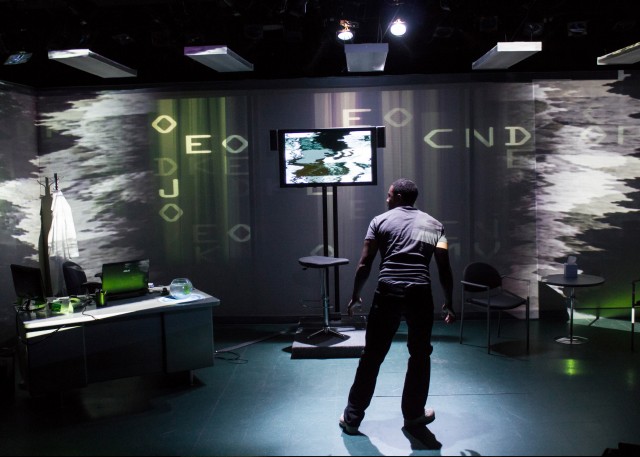
Multimedia show explores cutting-edge techniques for treating PTSD suffered by Iraq War veterans (photo by Lana Duiverman)
HERE
145 Sixth Ave. at Dominick St.
Tuesday – Saturday through June 22, $10 in advance, $18 within twenty-four hours
212-647-0202
www.here.org
In Christine Evans’s You Are Dead. You Are Here., Anthony Gaskins stars as Michael, an Iraq War veteran suffering from posttraumatic stress disorder. In order to stop his headaches and nightmares, he starts seeing Hannah (Kittson O’Neill), a doctor using new, innovative forms of therapy to treat soldiers with PTSD. She hooks Michael up to Virtual Iraq, a computerized simulation that takes him back to Fallujah as they try to re-create his experience so he can face it head-on and deal with it. Meanwhile, a young Iraqi woman, Zaynab (Kathreen Khavari), begins blogging about her life, the two technologies seemingly battling each other for prominence. Khavari also plays Nadia, Hannah’s assistant, who seems to have an ulterior motive to her constant interruptions of Michael’s therapy. You Are Dead. You Are Here. is a production of Transit Lounge, a collaboration between playwright Evans (Trojan Barbie, Slow Falling Bird), director Joseph Megel (The Brothers Size, The Last Seder), and media designer Jared Mezzocchi (The Elaborate Entrance of Chad Deity, Astroboy) that uses cutting-edge means of storytelling. For You Are Dead. You Are Here. they received permission to reconfigure Virtual Iraq, which is in fact used by the government to treat PTSD. The scenes between Michael and Hannah are gripping, with Gaskins delivering a terrifically complex performance as the troubled soldier. Zaynab’s broadcasts, which are projected onto a scrim, are somewhat confusing in both their relationship to Michael’s therapy and to Nadia’s appearances; there seem to be connections, but they are too vague and, ultimately, open-ended. The seventy-five-minute multimedia show, continuing at HERE through June 22, works best when it’s just doctor and patient — and computer software — getting right to the heart of one of the tragic outcomes of the Iraq War. The June 20 performance will be followed by the discussion “Returning Home: Bridging Civilian and Military Perspectives” with Dr. Barbara Olasov Rothbaum, the director of the Trauma & Anxiety Recovery Program at the Emory University School of Medicine.